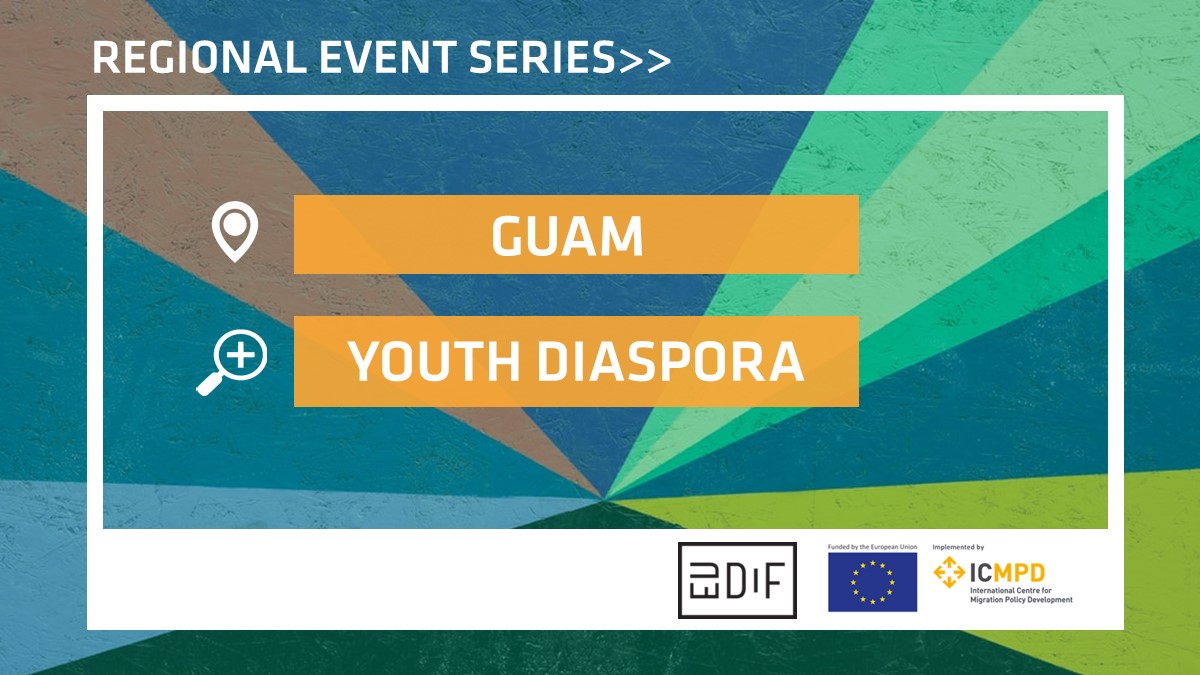
On 10 and 12 March 2021, we hosted a Regional Thematic Meeting on diaspora engagement in the GUAM countries (Georgia, Ukraine, Moldova and Azerbaijan). The event consisted of a public webinar followed by a Government-only roundtable and paid special attention to youth diaspora engagement.
The GUAM events are part of a global series of multi-stakeholder regional meetings on diaspora engagement. The regional series offers opportunities for exchange on regional trends and practices, to foster peer learning and establish connections. At EUDiF, we use the experiences and input collected to feed longer-term programming, as well as in the short-term to prepare for our upcoming global forum on diaspora engagement.
The GUAM events took stock of practices in the area of youth diaspora engagement from different perspectives, with testimonies from top officials from the region, youth diaspora individuals, representatives from the Parliamentary Assembly of the Council of Europe, academics and other key actors. Despite the varied standpoints, a number of patterns and recommendations emerged…
The question of identity is prevalent in the region. This is illustrated by the multitude of projects related to culture and language (e.g. through language schools abroad). This can be explained by a common history, coupled with the need to create independent states after the fall of the USSR. Participants insisted on the need to devise tailored approaches which recognise the heterogeneous nature of the diaspora in order to tap into both historic and contemporary diasporas.
A growing role for youth diaspora. The number of programmes engaging youth diaspora has significantly increased in the past five years. Such efforts demonstrate acknowledgement of the potential of youth diaspora from the region. Discussions showed that this will remain a priority in government agendas. In return, youth diaspora expressed great enthusiasm to play an increasing role in the development of their country of heritage.
“Being an ‘Ambassador’ totally changed my life. It was a huge emotional experience, showing what means to be a Georgian. It gives you the chance to keep feeling important for your country.” – Neno Gabelia, Young Ambassadors of Georgia to Italy, Program 2018-2019
Youth diaspora: transnational promoters of innovative solutions. Youth diaspora are prone to display a pioneering spirit and are tech-savvy. Youth are unique agents of change thanks to their ability to navigate multicultural environment, speak multiple languages and bring fresh, creative and ingenious ideas with high impact at low cost. This potential is illustrated by the youth diaspora-driven Eco Village Valeni project on eco-tourism and sustainable business solutions in Moldova and the effort of NGO Ukraine-2050 to involve youth diaspora in social media and monitoring missions to support the sustainable development of Ukraine.
Varied government outreach initiatives. Azerbaijan, Georgia and Moldova have greatly invested in initiatives to proactively strengthen ties with youth diaspora over recent years. Such initiatives include the Young Ambassadors Programme designed for Georgian youth living abroad to represent their country in the host countries, the Gala of Students originating from Moldova ‘Academic Excellence’, celebrating originality and innovation coming from Moldovans studying abroad, Moldovan Program Diaspora. Origins. Return (DOR) – literally meaning ‘missing your country’ – which targets children of young generation of diaspora, as well as Summer camps for youth diaspora, winter schools and the newly launched “Professional network of Azerbaijani diaspora youth” in Azerbaijan.Taking youth diaspora programmes to the next level. Participants agreedit is difficult to maintain consistency in engagement over time. There is a need to go beyond ad-hoc engagement and systematise opportunities over time. In addition, efforts should be made to more clearly communicate about those opportunities through various channels such as social media campaigns, e-portals, educational centres abroad etc. Lastly, to have a stronger impact, programmes should be scaled-up in terms of scope.
Increasing financial support to youth diaspora. Few practices exist in the region in this respect – e.g. the grant scheme of the Georgian Young Ambassadors Programme or the Diaspora Engagement Hub (DEH) in Moldova -but they provide inspiration to create other thematic grants and crowdfunding opportunities.
Leveraging (youth) diaspora human capital. GUAM countries have invested efforts to mobilise and/or attract back diaspora talents and expertise. The ‘Brain Gain’ programme (Beyin Qazanma Proqramı) run by Azerbaijan and the Development of Moldovan Diaspora Social Entrepreneurship (DOMDE) project have both demonstrated positive results in the area of knowledge transfer, investment and business creation. In the future, virtual, temporary and permanent return programmes could include a specific focus on youth diaspora. Conditions for mobility, integration, employment, entrepreneurship and education should be considered as part of such programmes to attract youth.
Capturing institutional know-how. Boosting knowledge management, both within governments and diaspora associations, is criticalto avoid institutional memory loss and develop a foundation and guidepost for optimizing current strategies and inform new programmes. Additionally, strong monitoring and evaluation systems should be devised to assess impacts of programmes and extract lessons learned.
Creating space for regular peer learning. Participants were keen to learn about inspiring practices in neighbouring countries and eager for more such opportunities in the future. The proliferation of new initiatives launched in the GUAM countries over recent years testifies to the dynamism of diaspora engagement. Regular exchanges will help to keep abreast of trends and identify collaboration opportunities.
Strengthening multi-stakeholder collaboration. Dialogue and partnerships with a wide range of actors, including from the intergovernmental organisations, parliamentarians, civil society and private sector, should be fostered to mutualise resources and increase effectiveness. The work done by the Council of Europe to advance parliamentary dialogue on diaspora engagement and offer training opportunities, particularly for youth diaspora, is commendable. Additionally, opportunities for multi-stakeholder cooperation could be factored into research projects, as done in the Case Study for the Caspian Basin Conference, which involved youth diaspora representatives from Azerbaijan to examine the future of the Caspian Basin situation.
To continue the discussion on the contribution of youth diaspora to today’s challenges, join the EUDiF Future Forum in June 2021!